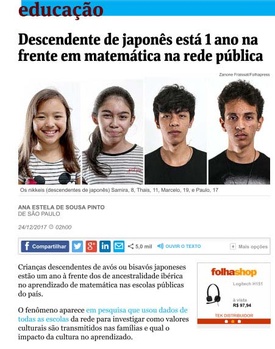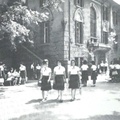
"Children with one parent of Japanese descent are one year ahead of their Iberian counterparts in mathematics achievement at public elementary schools," was the result of an intriguing survey published in the online edition of Folha newspaper at 2:00 a.m. on December 24, 2017. This is a groundbreaking survey that examines how the immigrant culture of parents affects children's academic achievement.
Based on the surnames of test-takers for the national academic achievement test, the academic achievement of those whose parents were of Iberian, Japanese, German, Eastern European, Italian, or Sirio-Libernese descent was compared. The results showed that children of Japanese descent performed particularly well in mathematics.
"Those with one parent of Japanese, German, Eastern European, or Italian descent outperform those of Iberian descent in math. If both the father and mother are Japanese, the math advantage is equivalent to one year of learning."
The study, conducted jointly by researchers Leonardo Monteiro and Daniel Lopes of the IPEA (Institute of Applied Economic Studies) and Gerardo Silva Filho of the INEP (National Institute of Educational Research), aimed to compare children (up to third generation) who were born in Brazil and studied at the same educational institution but have different cultural heritages.
The research methodology was to first research the origins of 71,000 surnames at the São Paulo State Immigrant Memorial, and then add 220,000 surnames using a computerized research program. These were then combined with the surnames of participants in the Censo Escolar 2013 and 2015, and the results were examined for the 74,608 people whose roots were identified. In other words, it was a genuine Brazilian survey.
Lopez pointed out that "culture alone does not cause differences in learning. And for some reason, the gap widens between the third and fifth grades of elementary school," and recommended further research.
One Japanese descendant interviewed by Folha said, "We're afraid of disappointing our parents, and there's an atmosphere that it's natural for things to go well and for people to make their lives better."
Christina Canto (43), a Japanese-American math teacher, also admitted in the same interview that "studying math is like playing an instrument or doing sports. It requires practice. There is something about the need for practice that Japanese-Americans naturally accept."
She questioned the idea that "Japanese people are naturally good at math," and even went so far as to research the idea in a master's degree at USP. Christina's parents are small shop owners. She told the paper that she was never forced to "study," but that "there was a belief (family atmosphere) that in order to have a good life, you have to get good grades in school."
Furthermore, Hiroko Ivecchi Nakagawa (60) also wrote in the article, "I feel that the weight of our family name is a sign of our family's honor. My mother only went to the third grade of elementary school, and my father only went to the fourth grade. They were ridiculed for their academic background, so our education was very important to them. Our parents were important to us, so we studied hard to live up to their expectations." She also has the same expectations for her granddaughter, Thais (11), saying, "I don't consider an eight out of 10 to be 'good.'"
According to the survey, the best performing families were those with "Japanese parents," followed by those of German descent, "Eastern European descent," "both parents not of Iberian descent," "Italian descent," and "one parent not of Iberian descent."
When parents' hardworking, serious, and honest personalities are passed on to their children and are demonstrated in their studies, it seems to have an impact on their school grades. Even if they study at the same school, it is natural that hardworking children will get better grades. If they get good grades and go to a good university, they will have a higher chance of getting a good job, which will lead to social advancement.
This was the strategy of Japanese immigrants after the war. The fact that this has continued uninterrupted for 73 years since the end of the war may be the greatest spiritual legacy that Japanese immigrants left in Brazil. I applaud the Brazilian researcher who investigated and uncovered this fact.
*This article is reprinted from the Brazilian community newspaper Nikkei Shimbun (January 16, 2018).
© 2018 Fukasawa Masayuki





